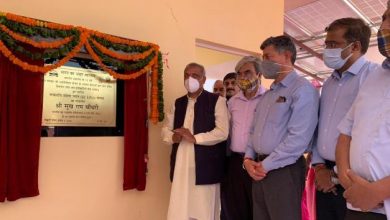COP Day 3 witnesses’ multitude of discussions on land and drought management
New Delhi: The 14th Conference of Parties (COP14) to United Nations Convention to Combat Desertification (UNCCD) which is currently underway at India Expo Centre & Mart, Greater Noida is holding multitude of significant discussions on land management. Some of the key highlights on day-3 of the UNCCDCOP14 include the meeting of the Committee on Science & Technology with a discussion on monitoring framework for the strategic objective on drought. Notable speakers from different countries contributed in the discussion.
The Conference of the Parties (COP) is considering the need for a specific indicator for the strategic objective on drought, which is contained in the United Nations Convention to Combat Desertification (UNCCD) 2018– 2030 Strategic Framework adopted by Parties at the thirteenth session of the Conference of the Parties (COP 13).
Taking into consideration that the Committee on Science and Technology (CST) assisted in defining and identifying monitoring frameworks for the other strategic objectives, including indicators, the COP requested the CST to assist in the work relating to the establishment of such a monitoring framework.
The Bureau of the CST, in collaboration with other members of the Science-Policy Interface (SPI), formed a working group to review the options and possible indicators, which are outlined in this document.

The working group took into consideration relevant work within UNCCD processes and from other associated intergovernmental processes related to the monitoring of drought and the resilience of vulnerable populations and ecosystems to drought, including indicators currently in use at the national level, as reported by Parties to the Committee for the Reviewof the Implementation of the Convention (CRIC), and various reports from other relevant international organizations.
The working group on drought also took into consideration past decisions of the COP, providing a framework for monitoring and evaluation of UNCCD impact/progress indicators, which allows the COP to set indicators for monitoring, while allowing for refinement, and enhance its potential effectiveness, based on national capacities and circumstances. The working group concluded that there are a wide range of approaches to defining and then monitoring drought.
The Global Mechanism Group held a side event to Launch of Technical Guide on LDN
Background- The Global Mechanism (GM) was established under Article 21 of the United Nations Convention to Combat Desertification (UNCCD) to assist countries in the mobilization of financial resources to implement the Convention and address desertification, land degradation and drought.
Background document- https://knowledge.unccd.int/sites/default/files/2018-09/LDN%20TPP%20checklist%20final%20draft%20040918.pdf
Gender Action Plan: UNCCD Secretariat
The Convention recognizes the importance of women in the implementation of the Convention, and identifies critical areas for their engagement: (i) awareness-raising, and participation in the design and implementation of programmes; (ii) decision-making processes that men and women adopt at the local level in the governance of development, implementation and review of regional and national action programmes (RAPs and NAPs); and (iii) capacity-building, education and public awareness, particularly at local level through the support of local organizations.
The TERI School of Advanced Studies also conducted a panel discussion on ‘How Green is our Food?’ including a case presentation and a session on Land Degradation Neutrality. It is noteworthy to mention that the India Pavilion which has been set up, witnessed today a green film making workshop – CMS Vatavaran (an international film festival and forum on environment and wildlife) on Cold Desertification in the Himalayan Region: Lessons for adaptation & mitigation.

India is the host country of UNCCD COP14 beginning from 2nd to 13th September 2019. Union Minister for Environment, Forest & Climate Change (MoEF&CC), Shri Prakash Javadekar mentioned on the opening day of the Conference that the Prime Minister, Shri Narendra Modi will inaugurate the high-level segment meeting on 9th September, 2019. Shri Javadekar also earlier stated that good outcomes are expected of the UNCCD which will be notified in the Delhi Declaration.
About UNCCD:
The UNCCD is an international agreement on good land stewardship. It helps people, communities and countries to create wealth, grow economies and secure enough food and water and energy, by ensuring land users have an enabling environment for sustainable land management. Through partnerships, the Convention’s 197 Parties set up robust systems to manage drought promptly and effectively. Good land stewardship based on a sound policy and science helps integrate and accelerate the achievement of the Sustainable Development Goals, builds resilience to climate change and prevents biodiversity loss.
The Convention entered into force in December 1996. It is one of the three Rio Conventions along with United Nations Framework Convention on Climate Change (UNFCCC) and Convention on Biological Diversity (CBD). India became a signatory to UNCCD on 14th October 1994 and ratified it on 17th December 1996.


